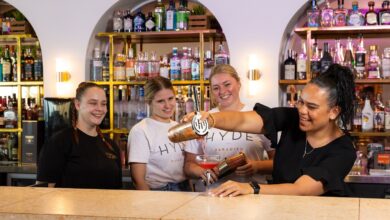
As the hospitality industry continues to face its worst staff shortage in decades, a situation described in senior management circles as having crippled the entire sector, a new national workplace survey has found 40 per cent of accommodation and food service staff feel their managers show little if any concern for their wellbeing.
The findings come at a critical juncture for the hospitality sector as many businesses struggle to combat staff shortages and close critical skills gaps, while others clamber over each other as they try to poach staff, offering ever-escalating wages to lure them across.
Accor Pacific CEO, Simon McGrath said there was a real and very genuine approach needed to be taken by any business as to how staff are cared for.
“This point in time is a good point in time because there can only be great change when there is conflict,” he said.
“And the conflict we are seeing now is right across the economy, and also hospitality where there is a desperate need for staff.
Typically, in the past, he said, the hospitality sector would see staff numbers topped up by international and casualised labour.
“But right now, they are no longer here,” he said.
“You don’t have 20 international students outside your door, so you have got to look after the people you’ve got and keep the people you’ve got.
“I think anyone acknowledges in any operating business there are things that aren’t right or possibly perfect in any business.
“But what makes them right very quickly is an open and transparent culture, one that respects its people, their diversity and one that opens transparent communication from the floor upwards.
“As an organisation we are faring well at the moment, we haven’t been impacted as much as other people and I am just thankful we’ve got what we’ve got.”
Conducted in October by YouGov on behalf of the Australian College of Applied Professions, the 40 per cent figure as it related to accommodation and food service employees was one of several startling results unearthed by the nationally representative survey of 1000 Australian workers.
One of the key finding revealed that more than half of those surveyed (a 53 percent total inclusive of 38 percent accom/food service workers) would hide a mental or physical health condition to avoid being judged or discriminated against.
Four in 10 workers (47 percent in total including a 29 percent of accom/food service workers) do not feel comfortable enough to be open about their personal interests, values, culture and/or lifestyle at work.
Almost half (49 percent in total inclusive of 40 percent accom/food workers) feel their workplace has introduced mental health and wellbeing initiatives just to ‘tick boxes’ while on a day-to-day basis, their managers shows little if any genuine concern or empathy for staffs’ wellbeing.
Lack of soft skills, or rather ‘people skills’, among managers and leaders was a key driver behind worker concerns, with 65 percent of workers saying their manager/boss struggles with soft skills, primarily empathy (27 percent), effective communication (25 percent), active listening (21 percent), flexibility (21 percent), and emotional intelligence (20 percent).
Accor Pacific has been on the front foot of the empathy issue for several years.
Introducing its ‘Peopleology’ concept in 2014, now recently evolved into ‘Heartist’, the program was created to address future HR challenges in a competitive job market based on a premise of respect for every individual’s differences irrespective of gender, age, and cultural background.
“The concept has been very successful and since been taken up globally by everyone, from the CEO down,” Mr McGrath said.
Mike Parker-Brown is a UK-trained and qualified journalist and an award-winning travel communicator with more than 30 years experience.
Since 2002, Mike has worked as a freelance writer and PR consultant providing his services to major organisations in Australia and internationally in the tourism, aviation, hospitality, recruitment and export marketing sectors.







